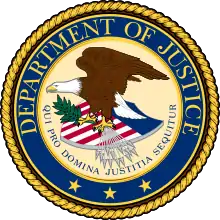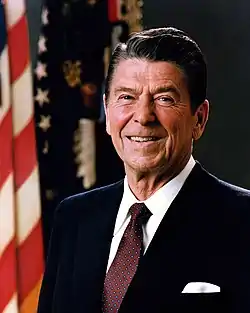Edwin Meese
Edwin Meese III (born December 2, 1931) is an American attorney, law professor, author and member of the Republican Party who served in official capacities within the Ronald Reagan Gubernatorial Administration (1967–1974), the Reagan presidential transition team (1980–81) and the Reagan White House (1981–1985), eventually rising to hold the position of the 75th United States Attorney General (1985–1988), a position from which he resigned following the Wedtech scandal.
Edwin Meese | |
|---|---|
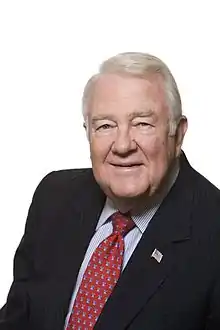 | |
| 75th United States Attorney General | |
| In office February 25, 1985 – August 12, 1988[1] | |
| President | Ronald Reagan |
| Preceded by | William French Smith |
| Succeeded by | Dick Thornburgh |
| Counselor to the President | |
| In office January 20, 1981 – February 25, 1985 | |
| President | Ronald Reagan |
| Preceded by | Robert T. Hartmann John Otho Marsh Jr. (1977) |
| Succeeded by | Clayton Yeutter (1992) |
| Personal details | |
| Born | Edwin Meese III December 2, 1931 Oakland, California, U.S. |
| Political party | Republican |
| Spouse(s) | Ursula Herrick (m. 1959) |
| Children | 3 |
| Education | Yale University (BA) University of California, Berkeley (LLB) |
| Military service | |
| Allegiance | |
| Branch/service | |
| Years of service | 1953–1984 |
| Rank | |
| Unit | |
| This article is part of a series on |
| Conservatism in the United States |
|---|
|
|
He currently holds fellowships and chairmanships with several public policy councils and think-tanks, including the Constitution Project and the Heritage Foundation.[2] He was also a Distinguished Visiting Fellow with the Hoover Institution at Stanford University.[3] He currently sits on the National Advisory Board of Center for Urban Renewal and Education. He is on the board of directors of The Federalist Society for Law and Public Policy Studies.[4] He has served on the board of Cornerstone closed end funds.
Early life and education
Meese was born in Oakland, California, the eldest of four sons born to Leone (née Feldman) and Edwin Meese, Jr.[5] He was raised in a practicing Lutheran family, of German descent.[6][7] His father was an Oakland city government official, president of the Zion Lutheran Church, and served 24 years in the non-partisan office of Treasurer of Alameda County.
At age 10, Meese published along with his brothers a mimeographed neighborhood newspaper, the Weekly Herald, and used the proceeds to buy a war bond. The young Meese also rode a bicycle on a paper route and worked in a drugstore. At Oakland High School, Meese was involved in the Junior State of America and led his high school debate team to statewide championships. He was recognized as valedictorian, class of 1949.[8]
Two weeks prior to graduation, he was accepted to Yale University and granted a scholarship. Meese served as president of the Yale Political Union, chairman of the Conservative Party, and chairman of the Yale Debating Association. Meese made the dean's list, and graduated with a bachelor of arts of political science in 1953.[8]
Military service
Meese became a member of ROTC upon enrollment at Yale, and upon graduation he obtained a commission in the United States Army as a Second Lieutenant. He spent 24 months at Fort Sill near Lawton, Oklahoma. Meese gained experience in logistics, conducting installation and operations of the 240 mm howitzer M1. Meese completed active duty in 1956 and continued in the United States Army Reserve, specializing in military intelligence. Meese retired from the Army Reserve as a colonel in 1984.[8]
Early career
.jpg.webp)
Meese returned to California, obtaining a law degree from the University of California, Berkeley School of Law, where he was a state Moot Court champion. He graduated in 1958 and accepted a position with the district attorney's office of Alameda County as a law clerk. While there, he worked under District Attorney J. Frank Coakley. He also worked with future DA Delwen Lowell Jensen. Jensen was engaged in developing a case-management software program known as Dalite.[9] Meese prosecuted felony cases while maintaining a private practice on nights and weekends, focusing on civil law. During this service, he first drew the attention of Republican State Senator Donald Grunsky, who would later recommend him to governor-elect Ronald Reagan.
In 1959 he married his high school sweetheart Ursula Herrick, daughter of Oakland's postmaster.[8]
California governor's office
Meese joined Ronald Reagan's staff in 1967. He served as legal affairs secretary from 1967 to 1968 and as executive assistant and chief of staff to Governor Reagan from 1969 to 1974. Despite his later well-known fondness for Reagan, Meese was initially reluctant to accept the appointment because he thought of himself as non-partisan: "I was not particularly interested."[8]
Meese was known for his "unique ability" to explain complex ideas to Reagan in a way that often mirrored Reagan's own speaking style and mannerisms. That made Reagan biographer Lou Cannon refer to Meese as "Reagan's geographer."[10]
After being named Reagan's chief of staff, Meese convinced his predecessor's deputy, Mike Deaver, to stay on with him, beginning a partnership that would last more than two decades.[11] For his role in Reagan's office, Meese earned reluctant praise from across the aisle. Bob Moretti, a Democrat and former Democratic Speaker of the Assembly, said, "Were I in the governor's seat, I would want someone like [Ed Meese] on my side."[12]
Berkeley riots
As Reagan's chief of staff, Meese was instrumental in the decision to crack down on student protesters at People's Park in Berkeley, California, on May 15, 1969. Meese was widely criticized for escalating the official response to the People's Park protest, during which law enforcement officers killed one student, on his way to class, who was not a protester and injured hundreds of others, including bystanders. Meese advised Reagan to declare a state of emergency in Berkeley, contrary to the recommendation of the Berkeley City Council. That resulted in a two-week occupation of People's Park by National Guard troops.
The first governor to turn to Meese for advice on riot control was Democrat Edmund (Pat) Brown, who first telephoned Meese seeking advice on how to best handle the situation. "I told him," Meese said, "that the people in that building should be arrested and taken out of there. I told him that if they were allowed to stay, there would be another mob scene, even bigger, the next day." Meese and Deputy District Attorney Lowell Jensen later served as co-counsels in the trial of Berkeley demonstrators. Meese was recognized as one of five "Outstanding Young Men of California" by the California Junior Chamber of Commerce for his role in countering the Berkeley demonstrators.[8] Meese's role in quelling the riots at UC Berkeley have been identified by critics and supporters as an example of a conservative law-enforcement philosophy at work.[13]
Industry and academia
From January 1975 to May 1976, Meese served as vice president for administration of Rohr Industries in Chula Vista, California. He left Rohr to enter private law practice in San Diego County, California.
After receiving a grant from the Sarah Scaife Foundation, Meese developed what he called "a plan for a law school center for criminal justice policy and management." The plan was accepted by The University of San Diego, a private Catholic school.[8] From the fall of 1977 to January 1981, Meese served as professor of law at the university, where he also directed the Center for Criminal Justice Policy and Management.[14] During the same time, Meese served as vice chairman of California's Organized Crime Control Commission and participated in the California Bar Association's criminal law section.[8]
Reagan presidency
Presidential campaign and transition
Following the Iowa caucuses, Meese joined the 1980 Reagan presidential campaign full-time as chief of staff in charge of day-to-day campaign operations and senior issues adviser.[15] After the 1980 election, Meese headed Reagan's transition effort.
At the advice of Meese, Reagan secretly allowed his campaign to establish a transition office to avoid difficulties similar to those faced by the Nixon administration in its own transition. "Ed had an uncanny ability to look down the road," said Pen James, Assistant to the President for Presidential Personnel. Meese's presidential transition team employed more than 1,000 individuals, with 311 being paid in federal funds, 331 working for a "token" $1, and the rest serving as volunteers. When accounting for inflation, the Reagan transition team spent less money than the Carter transition team, $1.75 million versus $1.78 million.[8]
Counselor to the President
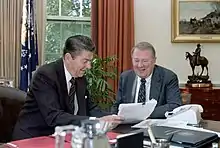
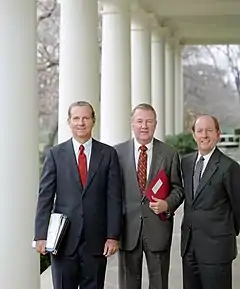
On November 17, 1980, Meese and James Baker held a meeting to divide their list of White House responsibilities, since both saw the potential for future conflict because of their positions being somewhat similar in nature. The one-page memorandum listed Meese's responsibilities as:
- "Counselor to the President for Policy (with cabinet rank);
- member Super Cabinet Executive Committee (in absence of the President and V-P preside over meetings);
- participate as a principal in all meetings of full Cabinet;
- coordination and supervision of responsibilities of the Secretary to the Cabinet; *coordination and supervision of work of the Domestic Policy Studies and the National Security Council;
- with Baker coordination and supervision of work of OMB, CEA, CEQ, Trade Rep and S&T; *participation as principal in all policy group meetings;
- attend any meeting which Pres attends – w/his consent."[16]
Meese became Counselor to the President, who appointed him as a member of both his Cabinet and the National Security Council from 1981 to 1985. On Monday, September 14, 1981, Meese chaired the first White House discussion of what would become Reagan's Strategic Defense Initiative (SDI), the missile defense program.[8]
Meese served as a liaison to the conservative evangelical community, arranging for meetings between social-conservative leaders and the president. Meese was lauded by social conservatives for his address to the Congress on the Bible in March 1982, when he said, "Someone has estimated that throughout the course of history man has adopted over four billion laws. It seems to me, with all that effort, we haven't improved one iota on the Ten Commandments."[17]
Near the end of Reagan's presidency, Meese's involvement in the Iran–Contra affair as a "counselor" and "friend" to Reagan was scrutinized by the Independent Counsel for Iran/Contra Matters, which stated in its official report that Meese's knowledge of the 1985 HAWK transaction "raised serious legal questions."[18]
Meese was considered a powerful and influential figure inside the White House. Former Reagan advisor and journalist David Gergen said, "He's a tremendously influential and highly valued adviser to the President who advises on issues all across the board. He's one of the men who has known [the President] so long and so well he's become almost an alter ego of Ronald Reagan."[8]
Comments on hunger in America
Meese created a "storm of controversy" in December 1983 after his responses to questions about hunger in America. In response to a question about balancing spending cuts against the need to feed hungry children, he said that he had seen no "authoritative" evidence that children in America were going hungry and that some of the allegations "are purely political." When asked about soup kitchens, he said that "some people are going to soup kitchens voluntarily.... I know we've had considerable information that people go to soup kitchens because the food is free and that that's easier than paying for it." Democratic leaders and social welfare activists called his comments "disgraceful," "an outrage," "unkind," "mean-spirited," and "absolutely ridiculous." Tip O'Neill, the Speaker of the House of Representatives, compared Meese to Ebenezer Scrooge.[19][20] Shortly after, Meese offered a tongue-in-cheek defense of Scrooge, saying that he "had his faults, but he wasn't unfair to anyone" and that he suffered from "a bad press."[21][22][23]
Attorney General
Reagan nominated Meese to be William French Smith's successor as Attorney General on January 23, 1984.[24] For more than a year, Democrats repeatedly charged Meese with unethical conduct to bar his confirmation as attorney general, including a report by Archibald Cox to the Senate on Meese's "lack of ethical sensitivity" and "blindness to abuse of position."[25]
However, he was finally confirmed by a vote of 63–31, with more opposition than any other Attorney General nominee had received since the 1920s. Meese became Attorney General in February 1985.[26]
In 1985, Meese received Government Executive magazine's annual award for excellence in management for his service in this role.[27]
Bechtel scandal
In the mid-1980s, there was a federal investigation into Meese's connections and alleged financial improprieties related to his efforts to help the Bechtel Corporation build an Iraqi pipeline. The pipeline was to extend from Iraq to Jordan and was negotiated by Meese, Shimon Peres, Bruce Rappaport, Robert C. McFarlane, and others. The report of special prosecutor James C. McKay cleared Meese of criminal wrongdoing but criticized him for ethical lapses, especially regarding bribes to Israel not to attack an Iraqi oil pipeline that benefited associates of the Attorney General.[28]
Iran-Contra scandal
In the late-1980s, Meese was investigated for his role in covering up the Iran-Contra Affair to limit damage to President Ronald Reagan.[29] Although evidence supporting this accusation came to light, Meese was ultimately not charged with any obstruction.[30]
Wedtech scandal
In February 1987, James C. McKay was named independent counsel in the Wedtech case. The investigation centered on actions Meese took that benefited him and his longtime friend and former lawyer, E. Robert Wallach. McKay looked into Meese's involvement, while Attorney General, in negotiations involving the company Wedtech. (E. Robert Wallach worked as a lobbyist for the company and sought help from Meese on Wedtech contract matters.)[31]
McKay never prosecuted or sought indictment of Meese, but in his official report, which is still confidential, he was highly critical of Meese's ethics and urged further investigation of Meese's role in that scandal and others such as Meese's efforts to help Bechtel Corporation. Meese described it as a "full vindication." While Meese was never convicted of any wrongdoing, he resigned in 1988 when the independent counsel delivered the report on Wedtech.[32]
Prior to his resignation, several top Justice Department officials resigned in protest of what they and others viewed as improper acts by the Attorney General.[33]
Reagan publicly voiced support for Meese in his role as Attorney General, during a press conference: "If Ed Meese is not a good man, there are no good men." That was in response to questions about his actions at the Justice Department.[27]
Meese Report
On May 21, 1984, Reagan announced his intention to appoint the Attorney General to study the effect of pornography on society.[34] The Attorney General's Commission on Pornography, often called the Meese report, convened in the spring of 1985 and published its findings in July 1986. The Meese Report advised that pornography was in varying degrees harmful.[35] Following the release of the report, guidelines of the Meese-led Department of Justice were modified to enable the government to file multiple cases in various jurisdictions at the same time which eroded some of the markets for pornography.[36]
Drug control policy
As Attorney General, Meese chaired the National Drug Policy Board, which coordinated with Nancy Reagan's "Just Say No," national anti-drug educational campaign. One of Meese's innovations was to seek the cooperation of drug-producing countries.
"One of our most effective weapons against drug traffickers," Meese wrote in his autobiography, "was to confiscate the assets of their criminal activity, such as expensive autos, yachts, businesses and homes.... To make this technique even more effective, we shared the proceeds with cooperating local law enforcement agencies to enhance their drug-fighting activities."[37]
Supreme Court views
In 1985 Meese delivered a speech calling for a "jurisprudence of original intent" and criticizing the Supreme Court for straying from the original intention of the U.S. Constitution. Justices William J. Brennan and John Paul Stevens disagreed with Meese publicly later that year. The dispute foreshadowed the contentious Robert Bork hearings of 1987.
Meese was well known for his opposition to the Miranda Warning ruling by the Supreme Court requiring a suspect's rights to be read to him before he is questioned by authorities.[38]
U.S News & World Report: You criticize the Miranda ruling, which gives suspects the right to have a lawyer present before police questioning. Shouldn't people, who may be innocent, have such protection?
Meese: Suspects who are innocent of a crime should. But the thing is, you don't have many suspects who are innocent of a crime. That's contradictory. If a person is innocent of a crime, then he is not a suspect.[38]
Iraq Study Group
In May 2006 Meese was named a member of the bipartisan Iraq Study Group by group co-chairmen James Baker III and Lee H. Hamilton, commissioned to assess and report on the contemporary status of the Iraq War. Meese co-authored the group's final December 2006 report.[39]
Fellowships and honors
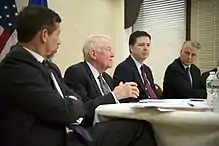
.jpg.webp)
Meese serves on the boards of several institutions. Meese has held the Ronald Reagan Chair in Public Policy at the Heritage Foundation since 1988, when he joined the think tank. It is the only policy chair in the United States officially named for the 40th president.[14][40] He is also chairman of Heritage's Center for Legal and Judicial Studies, founded in 2001 to advance conservative views about the Constitution, legal principles and their impact on public policy.[40]
Meese is currently the Second Vice Chairman of Landmark Legal Foundation, a conservative non-profit legal group.[41]
Meese serves as an Adjunct Fellow at the Discovery Institute and serves on the Board of Directors of the Junior State of America[42] Meese is also on the Board of Directors for the Capital Research Center, a conservative think tank devoted to the research of non-profit groups.[3]
Meese served on the executive committee (1994) and as president (1996) of the Council for National Policy (CNP), and he served as co-chairman of the Constitution Project's bipartisan Sentencing Committee.[43]
Meese served two terms as a member of the Board of Visitors of George Mason University from 1996 to 2004. From 1998 to 2004, he served as rector (chairman) of the board.[44]
For his lifetime of service and leadership, Meese was named the first-ever Honorary Reagan Fellow of Eureka College (Eureka, Illinois) at a ceremony in Washington, D.C. in 2008. Recognizing Meese as a model for young people, the honor was given on behalf of the Reagan Fellows program President Ronald Reagan established at his own alma mater in 1982. Meese is a charter member of the Ronald W. Reagan Society of Eureka College and a featured speaker at the "Reagan and the Midwest" academic conference held on campus to launch the Reagan Centennial in 2011.
In 2017 Meese became a Veteran Companion of the Military Order of Foreign Wars.
Meese serves as a member of the Board of Directors of the Mercatus Center at George Mason University, a non-profit market-oriented research, education, and outreach think tank located on George Mason University's Arlington campus.[45]
The Republican National Lawyers Association annually bestows the "Edwin Meese Award" to a notable Republican attorney/official. Previous recipients include Senator Lindsey Graham, Hon. John Ashcroft, Don McGahn, C. Boyden Gray, Hon. Michael Mukasey.
On October 8, 2019, president Donald Trump presented Meese the Presidential Medal of Freedom, the highest civilian honor in the United States.[46]
Books and film
Edwin Meese has authored or co-authored a number of books on government, judiciary and civics, including:
- A Familiar Exposition of the Constitution of the United States, Bicentennial Edition (1986)
- The Great Debate: Interpreting Our Written Constitution (1986)
- With Reagan: The Inside Story (1992) Regnery Gateway, 0-89526-522-2
- Making America Safer: What Citizens and Their State and Local Officials Can Do to Combat Crime (2000)
- Defending the American Homeland (2002)
- Leadership, Ethics and Policing: Challenges for the 21st Century (2004)
- The Heritage Guide to the Constitution (2005) ISBN 1-59698-001-X
- Judicial Tyranny: The New Kings of America? – contributing author (Amerisearch, 2005) ISBN 0-9753455-6-7
Edwin Meese has been a subject of many TV documentaries. Documentaries in which he personally appears include:
- In The Face of Evil (2004)
- William F. Buckley: Right from the Start (2008)
- Hippies (2007)
- I Want Your Money (2010)
References
- Heritage Foundation Archived April 30, 2009, at the Wayback Machine
- "Edwin Meese III". Hoover Institution. Retrieved June 6, 2019.
- "Federalist Society". fed-soc.org. Archived from the original on November 8, 2012. Retrieved November 28, 2012.
- Commerce, Montgomery Junior Chamber of (1965). "Outstanding young men of America". Cite journal requires
|journal=(help) - Bronner, Ethan (July 28, 1987). "Edwin Meese: Images In Contrast". Boston Globe.
- Coleman, Kate (May 4, 1986). "The Roots of Ed Meese : Reagan's Polemical Attorney General Has Prompted a Major Constitutional Debate, Surprising Those Who Knew Him in His Pragmatic Early Days, in the Quiet Hills of Oakland and During the Turbulent '60s". Los Angeles Times.
- Edwards, Lee. To Preserve and Protect, The Heritage Foundation, 2005, ISBN 0-89195-116-4.
- Fricker, Richard L. (1993). "The INSLAW Octopus". Wired: ppg.1–8. Retrieved August 28, 2008.
- Cannon, Lew (2005). Governor Reagan: His Rise to Power. PublicAffairs. p. 592. ISBN 978-1-58648-284-8.
- Heritage Foundation (November 2004). "Interview with Michael K. Deaver". Cite journal requires
|journal=(help) - Schieffer, Bob; Gary Paul Gates (1990). The Acting President. Plume. p. 45. ISBN 978-0-525-48579-7.
- Ravitch, Diane (1983), The Troubled Crusade, New York: Basic Books, p. 191, ISBN 978-0-465-08757-0
- Yost, Pete (July 14, 1988). "Meese to Join Heritage Foundation, Hoover Institution". Washington. The Associated Press.
- Wirthlin, Dick; Wynton C. Hall (2004). The Greatest Communicator: What Ronald Reagan Taught Me About Politics. Hoboken, N.J.: John Wiley & Sons. p. 45. ISBN 978-0-471-73648-6.
- Schieffer, Bob; Gary Paul Gates (1990). The Acting President. Plume. p. 83. ISBN 978-0-525-48579-7.
- Meese, Edwin. "Papers of Edwin Meese II". Stanford University.
- "Walsh Iran / Contra Report". Federation of American Scientists. November 1986. Retrieved August 24, 2009.
- Robert D. McFadden (December 10, 1983). "Comments by Meese on Hunger Produce a Storm of Controversy". The New York Times. Retrieved July 24, 2014.
- Lynette Clemetson (August 17, 2005). "Meese's Influence Looms in Today's Judicial Wars". The New York Times. Retrieved July 24, 2014.
- Francis X. Clines (December 16, 1983). "Meese Assails 'Myth' that Reagan has Weak Recorr on Poor". The New York Times. Retrieved July 24, 2014.
- "Edwin Meese finds soul-mate in Scrooge". Boca Raton News. December 16, 1983. Retrieved July 24, 2014.
- Edwin Meese defends hunger remarks, Ebenezer Scrooge (1983) on YouTube
- "CQ Almanac Online Edition". library.cqpress.com.
- Warner, Leslie Maitland (December 19, 1994). "Common Cause Bids Senate Vote against Meese". New York Times. p. A19. Retrieved May 6, 2016.
- Werner, Leslie Maitland (February 24, 1985). "Senate Approves Meese to Become Attorney General". The New York Times.
- "Speaker Bio: Edwin Meese". The Leadership Institute. Retrieved May 14, 2013.
- Meese and the Pipeline: The Story So Far New York Times. February 24, 1988.
- "Understanding the Iran-Contra Affairs". Brown University. Retrieved January 3, 2020.
- "Understanding the Iran-Contra Affairs: Edwin Meese III". Brown University. Retrieved January 3, 2020.
- Jackson, Robert L.; John J. Goldman (August 9, 1989). "Wallach Found Guilty of Racketeering, Fraud: Meese's Friend, Two Others Convicted in Wedtech Scandal". Los Angeles Times.
- "Atty. Gen. Meese Resigns : Says He's Been Cleared and Leaves With Clean Name : Acts After Prosecutor Files Report". Los Angeles Times. July 5, 1988. Retrieved July 5, 2011.
- ["Two Meese Aides Resign After Urging Ouster". Chicago Tribune. March 30, 1988. Retrieved May 1, 2019.
- Remarks on Signing the Child Protection Act of 1984, The American Presidency Project.
- Meese v. Playboy, National Review, September 26, 1986.
- Alberta, Tim. (November-December 2018). "How the GOP Gave Up on Porn". Politico website Retrieved November 11, 2018.
- Meese, Edwin (1992). With Reagan: The Inside Story. Regnery Gateway. p. 309. ISBN 978-0-89526-522-7.
- "Justice under Reagan: Reagan seeks judges with 'traditional approach' (interview)". U.S. News & World Report. 99 (1). October 14, 1985. p. 67. ISSN 0041-5537.
- Larson, Ian; Sucher, Lauren (May 31, 2006). "Edwin Meese Replaces Rudolph Giuliani on Iraq Study Group". United States Institute for Peace. p. 1. Archived from the original on June 1, 2006. Retrieved May 1, 2009.
- "Meese, Panel to Weigh Rule of Law at Tucson Event". Targeted News Service. Targeted News Service. January 1, 2010.
- landmarklegal.org/our-staff
- "The Junior State of America Announces Council of Governors for 2008–2009". Junior State of America. April 28, 2008. Retrieved August 24, 2009.
- "Archived copy". Archived from the original on August 13, 2007. Retrieved October 25, 2007.CS1 maint: archived copy as title (link)
- Walsch, Daniel (March 4, 2004). "Q&A with Edwin Meese, Rector of the Board of Visitors". The Mason Gazette. George Mason University. Archived from the original on September 27, 2011. Retrieved August 11, 2011.
- "Edwin Meese". Mercatus Center. August 15, 2008. Retrieved August 11, 2011.
- Cassidy, John. "What Ed Meese's Presidential Medal of Freedom Says About the G.O.P. and Impeachment". The New Yorker. Retrieved October 12, 2019.
External links
| Wikiquote has quotations related to: Edwin Meese |
| Wikimedia Commons has media related to Edwin Meese. |
- Appearances on C-SPAN
- Attorney General's Commission on Pornography
- Final Report of the Independent Counsel for Iran/Contra Matters – U.S. Court of Appeals
- Meese's bio at the Mercatus Center
- Edwin Meese at IMDb
| Political offices | ||
|---|---|---|
| Vacant Title last held by Robert T. Hartmann |
Counselor to the President 1981–1985 |
Vacant Title next held by Clay Yeutter |
| Vacant Title last held by John Marsh | ||
| Legal offices | ||
| Preceded by William Smith |
United States Attorney General 1985–1988 |
Succeeded by Dick Thornburgh |
